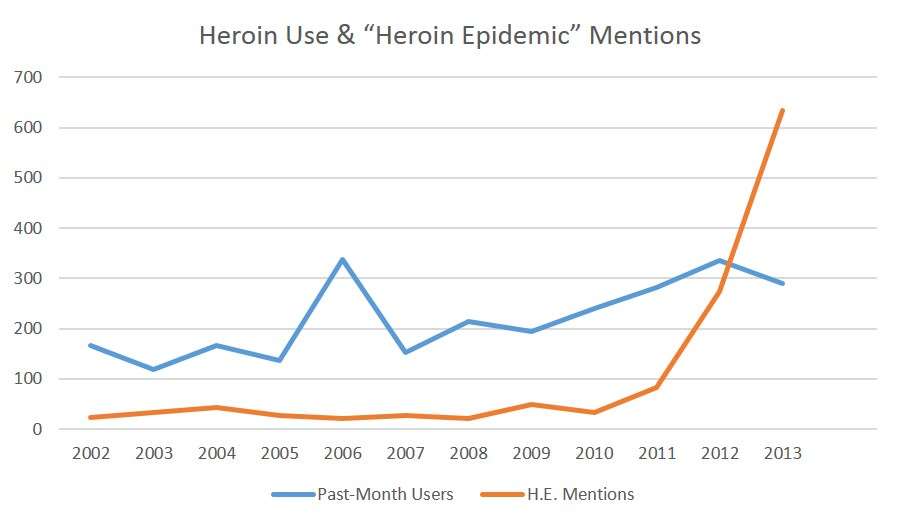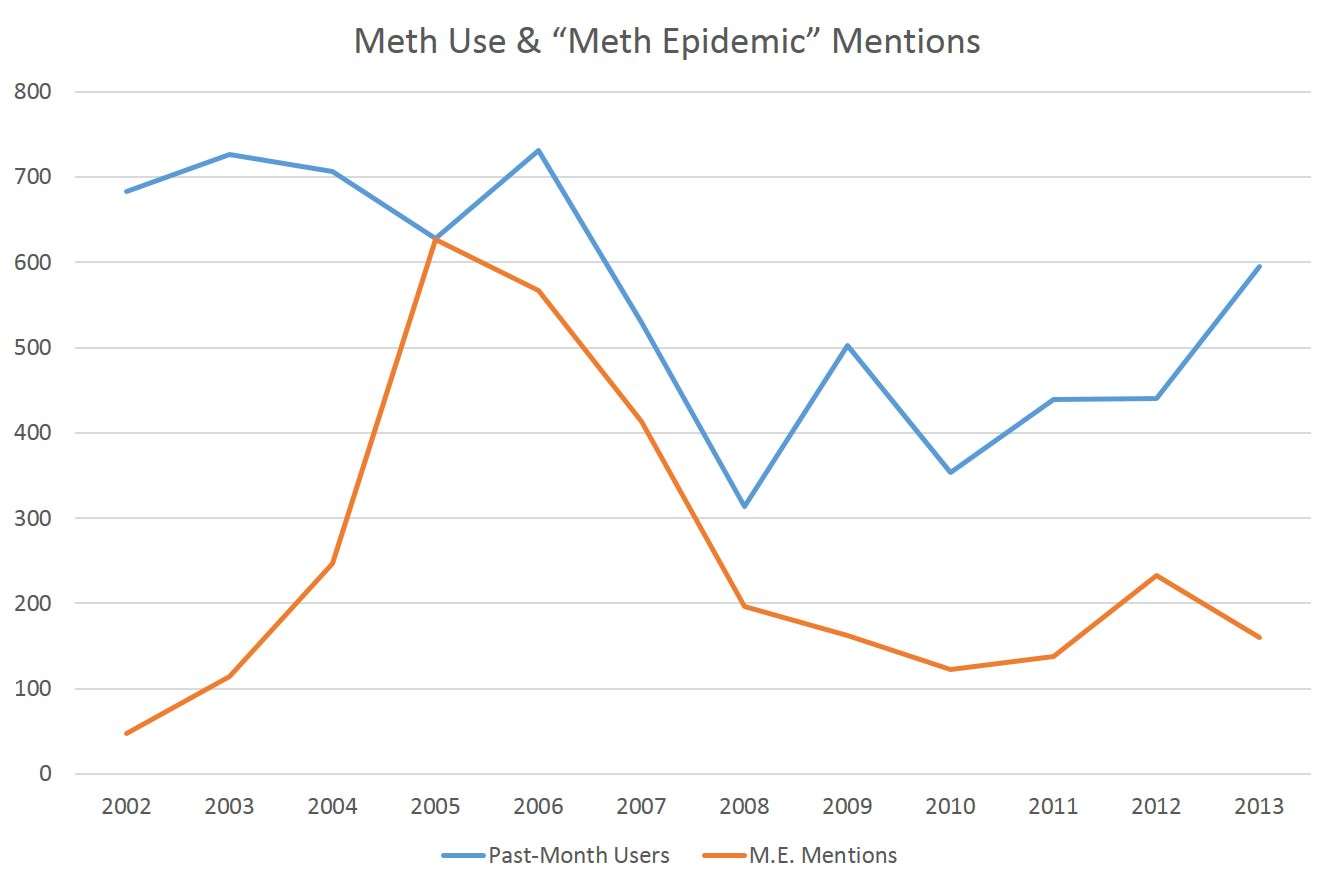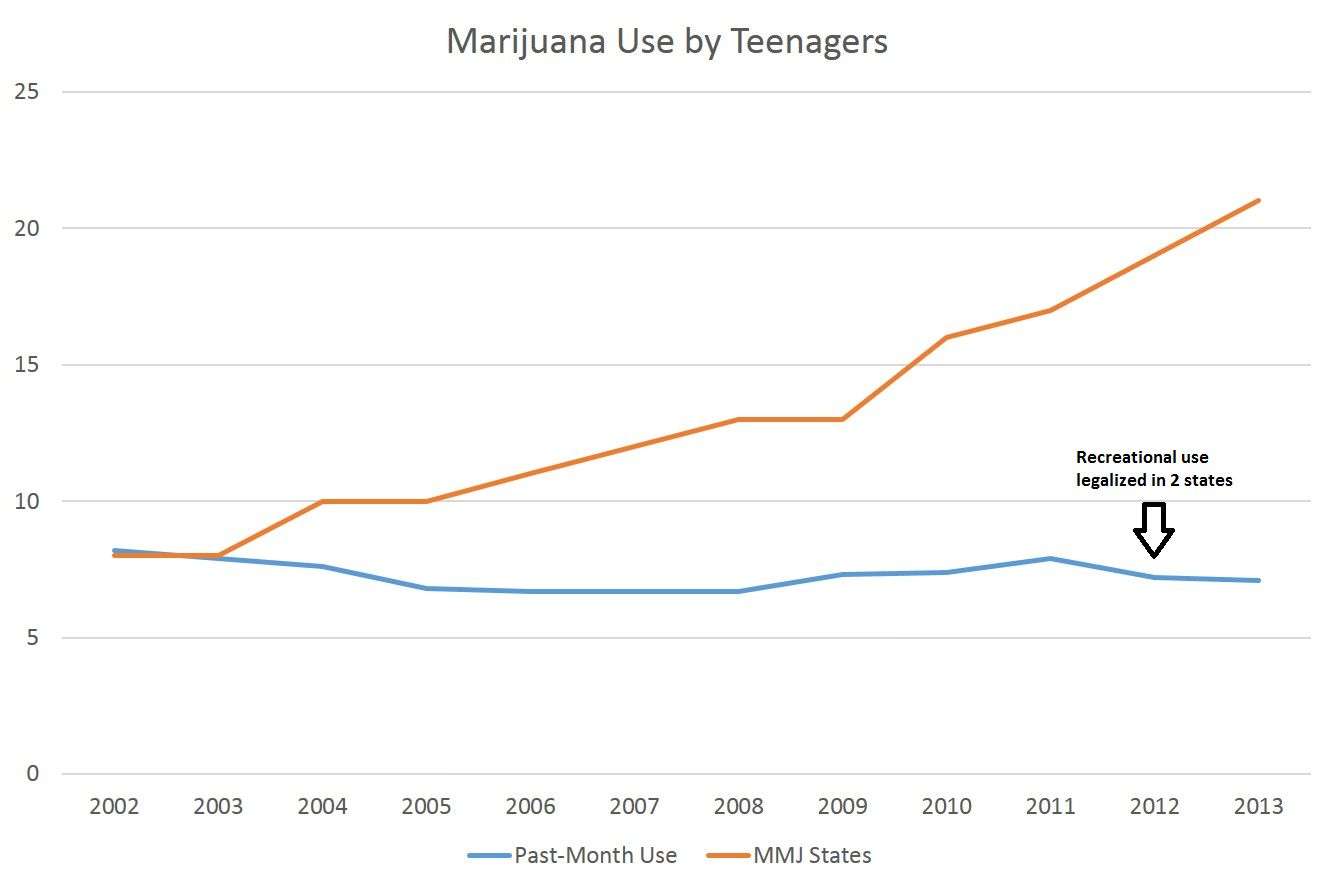New Survey Data Deflate Two Drug Scares
As heroin use and teenage pot smoking fall, alarm about them rises.

Survey data released this month by the federal government cast doubt on a couple of widely accepted beliefs about drug use trends: 1) that the nation is in the midst of an escalating "heroin epidemic" and 2) that loosening marijuana prohibition encourages teenagers to smoke pot.
In the National Survey on Drug Use and Health (NSDUH), the number of respondents who reported using heroin in the previous month fell by 14 percent last year, despite ever-rising concern about a new "heroin epidemic." While NSDUH probably misses a substantial number of heavy users (exactly how many is unclear), the trends identified by the survey still should indicate whether heroin consumption is on the rise or on the wane (as both government officials and journalists tend to assume). Hence it is instructive to compare past-month heroin use measured by NSDUH (in thousands of users) with mentions of a "heroin epidemic" in the newspaper and wire service articles collected by Nexis (above).
On the face of it, there is no clear relationship between the level of heroin use and the level of press attention to it. Notice that the spike in 2006, when the number of past-month users was higher than it has been in any year since then, seems to have prompted no journalistic response whatsoever. The more gradual increase seen after 2009, by comparison, coincided with an initial drop in "heroin epidemic" mentions, followed by a slight increase. Then the number of mentions skyrocketed, rising from 82 in 2011 to 273 in 2012 and 633 in 2013. So far this year there have been more than 2,300 references to a "heroin epidemic" in these news sources, reflecting the tremendous attention attracted by the actor Philip Seymour Hoffman's death on February 2 (which was caused by "mixed drug intoxication" but generally attributed to heroin alone). That single incident seems to have generated more talk of a "heroin epidemic" than everything else that happened in the previous 12 years. In any case, coverage of the putative epidemic really took off around the time when heroin use started to fall.
By contrast, press mentions of a "meth epidemic" during this period do seem to be at least partly driven by the number of people using the drug:

Press mentions peaked in 2005, and past-month meth use peaked a year later; both fell sharply after that. The 2009 spike in meth use does not seem to have attracted much attention, but the two trends were more or less in sync between 2010 and 2012. Last year meth use rose while press coverage fell.
Although you might assume that public attention to a drug would reflect underlying trends in use of that substance, that is often not the case. Ronald Reagan ramped up the war on drugs at a time when drug use was already declining. His successor, George H.W. Bush, gave his "bag of crack" speech years after cocaine consumption peaked (as measured by NSDUH's predecessor, the National Household Survey on Drug Abuse). Just as Hoffman's death seems to be the single most important factor driving the recent explosion in press coverage of heroin, the 1986 death of basketball player Len Bias, at a time when cocaine use was falling, drove the political panic that gave us insanely disproportionate federal crack sentences (even though Bias snorted cocaine rather than smoking it).
As the sociologist Nicholas Parsons points out in his recent book Meth Mania, earlier press panics about speed likewise were only tenuously related to the number of people consuming it. Parsons found that coverage of methamphetamine in Time and The New York Times shot up in 1967, driven largely by a single incident: the rape and murder of Linda Fitzpatrick, a teenager from a wealthy Connecticut family who dropped out of an exclusive private school and reportedly got hooked on Mephedrine. In that respect, Linda Fitzpatrick was the Philip Seymour Hoffman (or Len Bias) of her day.
What about the assumption that less repressive marijuana laws foster attitudes that lead to more underage consumption? For years drug warriors have been warning that easing up on marijuana, or even talking about it, would "send the wrong message" to the youth of America, encouraging them to smoke pot by making it seem safe and socially acceptable. Call it the "permitted fruit" effect.
"How can we expect our children to reject drugs when some authorities are telling them that illegal drugs should no longer remain illegal, but should be used instead to help the sick?" Thomas Constantine, then head of the Drug Enforcement Administration, asked just before California voters approved the nation's first medical marijuana law in 1996. "We cannot afford to send ambivalent messages about drugs." John Walters, George W. Bush's drug czar, likewise cited the purported threat to teenagers when he urged voters to reject medical marijuana initiatives. Gil Kerlikowske, President Obama's first drug czar, took up the same theme. "We have been telling young people, particularly for the past couple years, that marijuana is medicine," he complained in 2010. "So it shouldn't be a great surprise to us that young people are now misperceiving the dangers or the risks around marijuana."
Drug use trends in states with medical marijuana laws do not provide much evidence to back up these warnings, and the nationwide survey data released this month cast further doubt on the idea that allowing patients to use marijuana for symptom relief makes the drug more attractive to teenagers. The percentage of respondents between the ages of 12 and 17 who reported marijuana use in the previous month was lower last year than it was in 2002 (when the survey started), even though the number of jurisdictions with medical marijuana laws rose from eight to 21 during that period. (Three more states—Maryland, Minnesota, and New York—joined the list this year.) The rate of past-month use among teenagers during this period ranged from a high of 8.2 percent in 2002 to a low of 6.7 percent in 2006, 2007, and 2008. The upward trend after 2008 seems to be reversing, even though two states that had already legalized marijuana for medical purposes, Colorado and Washington, legalized recreational use in 2012, a development that attracted a great deal of attention across the country.

The question of whether legalizing marijuana for medical or recreational use encourages pot smoking among teenagers by making it seem more appealing (or less scary) is distinct from the question of whether such reforms increase underage consumption by making access easier (via diversion from legal buyers). As I pointed out last month, data from the Youth Risk Behavior Survey (YRBS) suggest that dynamic is not having much impact so far in Colorado, where medical use has been legal since 2001. According to a recent report from the federal government, however, state-specific NSDUH data indicate that past-month marijuana use by teenagers was, on average, 25 percent higher in the three years after medical marijuana was commercialized in 2009 than in the three years before that. Nationwide, according to NSDUH, that number rose by about 12 percent during the same period. The bigger increase in Colorado is consistent with the idea that diversion from legal buyers is boosting marijuana use by teenagers. But it is inconsistent with the Colorado-specific data from the YRBS, which the report does not cite.
The finding also seems to be at odds with the results of broader studies that compare states with medical marijuana laws to other states. In a working paper published last July, for example, three economists examine data from the National Longitudinal Survey of Youth and the Treatment Episode Data Set as well as the YRBS. They conclude that "our results are not consistent with the hypothesis that the legalization of medical marijuana caused an increase in the use of marijuana among high school students."
This article originally appeared at Forbes.com.
Editor's Note: As of February 29, 2024, commenting privileges on reason.com posts are limited to Reason Plus subscribers. Past commenters are grandfathered in for a temporary period. Subscribe here to preserve your ability to comment. Your Reason Plus subscription also gives you an ad-free version of reason.com, along with full access to the digital edition and archives of Reason magazine. We request that comments be civil and on-topic. We do not moderate or assume any responsibility for comments, which are owned by the readers who post them. Comments do not represent the views of reason.com or Reason Foundation. We reserve the right to delete any comment and ban commenters for any reason at any time. Comments may only be edited within 5 minutes of posting. Report abuses.
Please to post comments


that the nation is in the midst of an escalating "heroin epidemic"
Ah, like the suburban paper here.. http://www.dailyherald.com/topics/heroin/
I noticed that the survey data say nothing about the actual scourge of jenkem on our streets.
"That's some good shit."
Survey data released this month by the federal government cast doubt on a couple of widely accepted beliefs about drug use trends
Damn it, Jacob, must you always be such a wet blanket?
You know, this sort of mindless media scare-mongering click-bait crap used to annoy me, but I find that if I smoke a little opium before reading this stuff I can stay calm about the stupidity of it all.
I heard all the scare tactics in school,and from the parents growing up.Then,went I was 18 or 19,I smoked pot at times with friends.Wasn't a big deal,so I saw the lie.Didn't stick with it though,I prefer good beer and red wine.
I smoked pot from 8th grade into my 20's. Didn't drink till college, at which time I also tried coke (too asspensive) and acid (fun a few times - no good once working).
GATEWAY DRUG!
can't wait to retire, cause I'm gonna start smoking pot EVERY DAY again when I do 🙂
Nothing wrong with a touch of opiate..if it wasn't the forbidden fruit, we'd have a lot of folks partaking small doses for pain relief, etc.
As to the rise in pot use - we'd have to measure it against any potential drop in booze, glue sniffing, cigarettes and other more dangerous drugs - if we even cared about the mortality and/or danger aspects.
years ago I was given tylanol 3 for a broken finger,took one.Made me sick.Never again.Sam Adams for me
"tylanol 3 for a broken finger,took one.Made me sick.Never again.Sam Adams for me"
Show you what DNA does....if I drink, I can't sleep and wake up with a headache, but Tylenol 3 makes me actually feel better (worked heavy physical jobs for much of my life with the predictable effect on my back).
Pot, though, only gets me stoned - a feeling I don't enjoy because it's too non-productive. Turns out I've been ingrained with that "have to be productive" disease!
You lamestream libertarians are approaching the drug issue in a totally ineffectual way; skepticism is a philosophical dead-end.
You try to project skepticism towards the idea that drugs are harmful to human life. Guess what, dipshits, drugs actually *are* destructive to human life! Your attitude of "heroin isn't that bad anyway, man" is a blind fantasy. The teacher from South Park was right, fools.
The drug war was founded on the idea that drugs had to be outlawed because drugs were bad for "society"; you guys are standing there saying, "Drugs aren't so bad, man; drugs aren't bad for society." But in that case, you are accepting the premise of the collectivists; they want to protect society, you say don't worry, society isn't in trouble anyway.
Drop the altruism and collectivism. Yes, it is crudely obvious that drugs are destructive to human life--but this is no good reason to make them illegal, for it is a choice that an *individual* must be free to make for himself. It's like suicide; no sane person would argue that suicide should be illegal (though they did criminalize it in the USSR).
"Yes, it is crudely obvious that drugs are destructive to human life--but this is no good reason to make them illegal"
That is your OPINION. It's not FACT like saying Koch plant emissions cause more cancer or respiratory disease, etc.
Both items, though, are subject to comparisons with the options. If the Koch refineries are truly using the best available technology to reduce emissions...and if the products help us all to some degree, we may accept that trade-off as a society (yes, collectively).
If smoking pot is keeping the stoner from being a drunk, society may actually benefit.
Steve Jobs as well as others have claimed LSD was central to their creativity and world view. In fact, drugs were part of parcel of the entire early Silicon Valley Culture - mind expansion tends to benefit creativity.
Drugs fueled the counterculture - which, despite certain negatives, came to the "libertarian" conclusions like:
1. Get the gubment out of our heads and bodies
2. Ain't gonna go to war no more
3. Life is for living and pleasure and enjoyment....
You can't say all these things are "bad" compared to the typical drugs of society - those being caffeine, tabbaco and booze.
Heck, the "natural" drugs (hormones, etc.) can be extremely destructive especially since our bodies haven't adjusted for modern life. That's why fear is used to keep us all in line and at way.
It's not my opinion that people destroy their minds, bodies, and lives by choosing to take drugs; that is factual, you evasive little turd. And you even brought the Koch brothers into it? You leftoids are a mindless, boring parody of yourselves at this point.
I'm not surprised you would claim otherwise, since it dovetails with the same reason you are a collectivist leftoid: you don't want to face reality, you want to take drugs on the premise that reality will cease to be real if you are too fucked up to notice it. Drugs are for existential cowards, and it is pathetic when losers like you try to rationalize it by claiming that drugs "open your mind" or incite creativity. What you create when you're on drugs is worthless bullshit.
Did Aristotle, Newton, Edison, Tesla, Rockefeller or Carnegie need drugs to change the world as they did? No--because they were men, which you (and all your loathsome ilk) are not.
But I surely hold that drugs should not be outlawed--with hope that all the bums like you will kill yourselves off.
My buddy's mother makes $83 /hour on the computer . She has been fired from work for 7 months but last month her income was $16557 just working on the computer for a few hours.
you can check here ---------- http://www.jobsfish.com